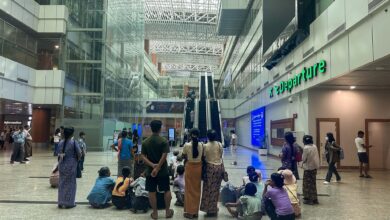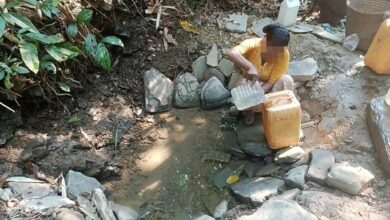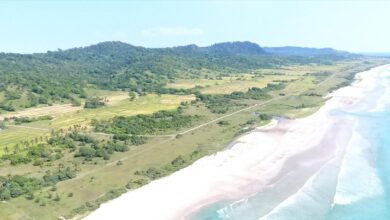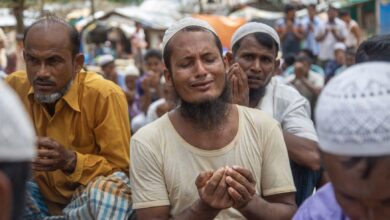
Half a lifetime ago, 39-year-old Yangon resident Nyein Chan Hmu was part of an unlikely rebellion that pitted students of a military college against the junta that then ruled Myanmar.
In 2002, he was a member of the fourth batch of cadets at the Military Technology College (MTC) in Pyin Oo Lwin. This was also, as it turned out, the last batch, as the new college was closed that same year following a mutiny by its students.
Angered to learn that they would graduate at a lower rank than they had expected, and without the professional qualifications they had hoped to obtain, the students rose up. And the army, true to form, cracked down.
Thousands of students were caught up in that little-known uprising, and by the time it was all over, dozens were serving long prison sentences for daring to challenge the top generals’ authority.
“Twenty years ago, we had a revolution because we didn’t like the dictators. Now it is happening all over again,” the former cadet recalled.

In the years since that early experience, Nyein Chan Hmu has mostly steered clear of politics. But when the army stormed back into power earlier this year, he knew he couldn’t just sit back and watch the situation unfold.
Twenty years ago, we had a revolution because we didn’t like the dictators. Now it is happening all over again
“I feel so sad and angry when I think about how it was under successive military regimes. They did no good at all,” he said.
Believing that the country would be plunged into darkness if it remained under the army’s control, he decided to join nationwide calls to restore civilian rule.
Bitter reality
At first, he thought that an overwhelming display of solidarity among the country’s people might be enough to win the day. To show his support for the movement, he did everything from donate food and medicine to provide security for protesters.
But as the weeks passed, he grew sceptical. Finally, on February 28, he was forced to face a bitter reality that he had already been exposed to in his youth.
On that day, regime forces shot and killed a protester named Nyi Nyi Aung Htet Naing near Yangon’s Hledan junction, where thousands had gathered to demonstrate against the junta. Nyein Chan Hmu was also there, part of the massive crowd that scattered as heavily armed police opened fire.
He managed to escape with his life, but any hope he might once have had that the military could be peacefully pressured to give up power was now shattered.
“It’s no use throwing eggs at a stone. In the long run, if the unarmed have to deal with the armed, the unarmed will have a harder time of it. There will be many losses,” he said.
Finally, in late April, he made the difficult decision to join the armed resistance movement. Once he had made up his mind, he wasted no time traveling to a liberated area to enlist in the People’s Defence Force (PDF) formed by the shadow National Unity Government.

His family was not happy to see him leave his home and his fabric business in Yangon behind.
“They did not agree with my decision. Everyone was bitter about it. But I had no choice, because I felt it was something I had to do. In the end, I thought this would be the best way, so I went ahead and did it,” he explained.
It’s no use throwing eggs at a stone. In the long run, if the unarmed have to deal with the armed, the unarmed will have a harder time of it
His family also acted decisively. In the August 18 edition of the state-run newspaper Myanma Alin, his mother announced that her son had been disowned.
“As their son, I don’t want to say anything about the disownment,” Nyein Chan Hmu said without betraying any particular emotion. “I just want my parents to see me return successfully.”
Fighting spirit
It was not the first time that he had disappointed his parents by following his convictions. That was how he ended up at MTC in the first place.
Nyein Chan Hmu wanted to become an engineer after finishing the 10th grade, but he didn’t want to burden his family with the expense of sending him to university. That’s why he opted for the MTC, which covered all costs for successful candidates.
Even before the situation there deteriorated, however, he could see that the college would not live up to his expectations.

Of the 16 courses it was supposed to offer, only six were actually available. When it became clear that the school would never deliver on its promise of providing a decent education, the students grew restive.
Although the uprising was eventually crushed, Nyein Chan Hmu said that it taught him a valuable lesson—namely, the importance of having common goals when fighting for a just cause.
We only have our fighting spirit. We will fight until we win. We may lose our lives in the struggle, but it doesn’t really matter
Kyaw Thu Soe, an MTC alumnus who spent seven years in prison for his role in the mutiny, said the fight was worth it, even if it ended badly.
“I saw a lot of losses for the future, both as a soldier and as a young person. That’s why we resisted injustice,” he said.
In 2016, Kyaw Thu Soe published a book about this almost forgotten episode titled “College Rebels”. He said he’s proud of the MTC alumni who continue to serve the country.
Two decades and another generation later, Nyein Chan Hmu says he still believes that the junta can be defeated. All he wants is to play his part.
“We only have our fighting spirit. We will fight until we win. We may lose our lives in the struggle, but it doesn’t really matter,” he said.



